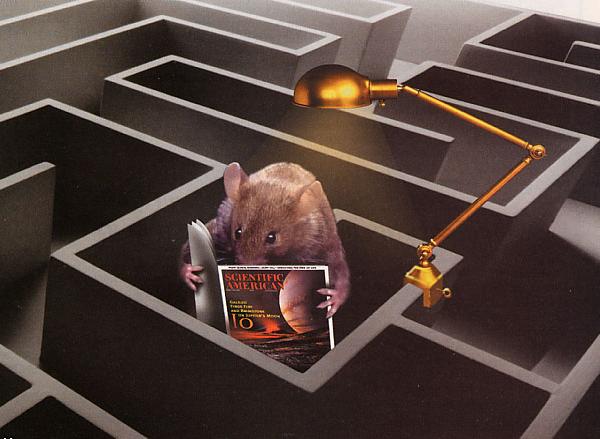The latest issue of the scientific journal Nature has a report on ‘smart mice’ that have certain genetic manipulation to enhance some brain functions. Compared to normal ones, these manipulated mice show better performance in a variety of standard tests. For example, it takes fewer trials for them to find the floating platform when swimming in a body of water (the water maze), or they are able to find their way through a more complicated labyrinth in a shorter time. However these advantages do come with some trade-offs. The mice that perform better in a complicated labyrinth perform less well in a simpler labyrinth than normal mice, and one of the manipulated genes in another type of smart mice is often involved in cancer development. (If you cannot read the article online, please ask me for a pdf copy.)
Of course the scientists hope to learn something from the mice to advance treatments for neurological disorders or enhance mental functions. But before they can reach meaningful and definitive conclusions from their studies, many of us can’t already wait to enhance our mental performances with medications that were originally intended for counteracting attention deficiency or improving alertness under sleep deficit. With the continual improvement in gene technology, it’s not so far-fetched that one day we may be able to tweak our genomes for improving our mental abilities or curing some currently intractable neurological conditions.
The longer term consequences of such ‘mental enhancement’ in humans are yet to be seen for ages to come because of our longer lifespan. If anything can be generalised from the mice experiments, it would be that there is a price to pay for any enhancement to brain function, be it subtle and of longer tem or deleterious and immediate. At this stage, we simply don’t know enough of how the brain works to be able to manipulate it profitably at will without side-effects. High-performing autism provides a good illustration of how individuals displaying extreme talent in a specialised field often have a flip side in the form of difficulties in social interactions. Can there ever be a person with an all-round brain? Even if human technology may never get us there, will natural evolution be able to do it for us one day, given enough time? These days many of us can’t help but notice how today’s baby and young children are smarter than their generation, because of improved health standards, better care and greater environmental stimuli. This has no doubt provided a good starting point for evolution to select for a smarter future human race with better capabilities of the brain.

最新一期科學期刊《自然》有篇介紹「聰明老鼠」特寫,這些老鼠經過基因改造後,腦功能有所提升,在多種實驗室測試中比正常老鼠有較佳表演,例如放在水裡游泳時能更快找到浮台,又或在複雜的迷宮中更快找到出口,但有得必有失,那些在複雜迷宮表演較佳的老鼠在簡單迷宮反而不及正常老鼠,而另一種聰明老鼠被更改的基因則有份參與癌症形成的過程。(如未能在網上閱讀原文,請問我索取pdf文本。)
研究這些聰明老鼠的目的,是希望可以研制出醫治神經疾病或提升腦功能的療法,但很多人都不等這些研究結果了,近年都開始自行服用原來治療注意力不集中或在長期睡眠不足下提醒的藥物,以提升工作或學習的表演。隨着基因科技日益進步,他日透過改造基因以增強腦功能或醫治神經疾病,也並非天方夜譚。
究竟人類利用藥物提升腦功能有甚麼長遠後果,也許不會像實驗老鼠一樣很快便看到,但這些老鼠實驗要是能帶出一個訊息,那就是提升腦功能就得付出代價——可能祇是輕微而經較長時期才浮現,或是即時可見且有嚴重負面影響的。我們目前對腦的認識實在太少,根本沒有把握可以隨意提升任何功能而無損其他方面,有些患了自閉症的人,在特定領域有非人成就,卻難以和他人正常交往,正好說明了腦功能有多複雜。人類擁有一個全能腦裝是有可能的事嗎?就算人類科技力有不逮,自然進化長遠又會不會為人類帶來這樣的腦袋?現代人往往驚嘆,今時今日的嬰孩和兒童都比以前聰明,全賴醫學進步、照顧更周全和更多環境刺激所賜,自然進化的起點向前推進,將來經進化篩選的人類,腦袋祇會愈見發達。
Of course the scientists hope to learn something from the mice to advance treatments for neurological disorders or enhance mental functions. But before they can reach meaningful and definitive conclusions from their studies, many of us can’t already wait to enhance our mental performances with medications that were originally intended for counteracting attention deficiency or improving alertness under sleep deficit. With the continual improvement in gene technology, it’s not so far-fetched that one day we may be able to tweak our genomes for improving our mental abilities or curing some currently intractable neurological conditions.
The longer term consequences of such ‘mental enhancement’ in humans are yet to be seen for ages to come because of our longer lifespan. If anything can be generalised from the mice experiments, it would be that there is a price to pay for any enhancement to brain function, be it subtle and of longer tem or deleterious and immediate. At this stage, we simply don’t know enough of how the brain works to be able to manipulate it profitably at will without side-effects. High-performing autism provides a good illustration of how individuals displaying extreme talent in a specialised field often have a flip side in the form of difficulties in social interactions. Can there ever be a person with an all-round brain? Even if human technology may never get us there, will natural evolution be able to do it for us one day, given enough time? These days many of us can’t help but notice how today’s baby and young children are smarter than their generation, because of improved health standards, better care and greater environmental stimuli. This has no doubt provided a good starting point for evolution to select for a smarter future human race with better capabilities of the brain.

最新一期科學期刊《自然》有篇介紹「聰明老鼠」特寫,這些老鼠經過基因改造後,腦功能有所提升,在多種實驗室測試中比正常老鼠有較佳表演,例如放在水裡游泳時能更快找到浮台,又或在複雜的迷宮中更快找到出口,但有得必有失,那些在複雜迷宮表演較佳的老鼠在簡單迷宮反而不及正常老鼠,而另一種聰明老鼠被更改的基因則有份參與癌症形成的過程。(如未能在網上閱讀原文,請問我索取pdf文本。)
研究這些聰明老鼠的目的,是希望可以研制出醫治神經疾病或提升腦功能的療法,但很多人都不等這些研究結果了,近年都開始自行服用原來治療注意力不集中或在長期睡眠不足下提醒的藥物,以提升工作或學習的表演。隨着基因科技日益進步,他日透過改造基因以增強腦功能或醫治神經疾病,也並非天方夜譚。
究竟人類利用藥物提升腦功能有甚麼長遠後果,也許不會像實驗老鼠一樣很快便看到,但這些老鼠實驗要是能帶出一個訊息,那就是提升腦功能就得付出代價——可能祇是輕微而經較長時期才浮現,或是即時可見且有嚴重負面影響的。我們目前對腦的認識實在太少,根本沒有把握可以隨意提升任何功能而無損其他方面,有些患了自閉症的人,在特定領域有非人成就,卻難以和他人正常交往,正好說明了腦功能有多複雜。人類擁有一個全能腦裝是有可能的事嗎?就算人類科技力有不逮,自然進化長遠又會不會為人類帶來這樣的腦袋?現代人往往驚嘆,今時今日的嬰孩和兒童都比以前聰明,全賴醫學進步、照顧更周全和更多環境刺激所賜,自然進化的起點向前推進,將來經進化篩選的人類,腦袋祇會愈見發達。
Comments
太過扭曲天然,一定有遺憾。
多謝推介!
結局很悲慘,看完心噏了整天。
不過真的很值得看,不長,應該納入中學教材。